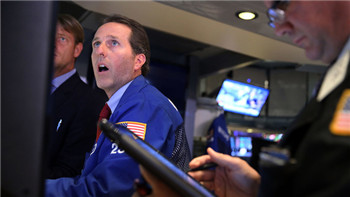(单词翻译:单击)

Although economics was derided by the historian Thomas Carlyle as the “dismal science,” it is optimism that infects the profession — and it runs so deep that economists rarely see recessions coming.
虽然历史学家托马斯•卡莱尔(Thomas Carlyle)曾把经济学揶揄为“沉闷的科学”,但实际上这一学科的问题在于受到乐观情绪的感染,这种影响如此之深,以至于很少有经济学家能预见经济衰退的到来。
Even in early 2008, when markets were crashing, a survey of leading forecasters by the Philadelphia branch of the Federal Reserve showed that none predicted negative growth for the US that year.
即便在2008年初市场开始崩盘之际,费城联邦储备银行(Philadelphia Fed)对多位著名预测专家所做的一项调查显示,没有一个人预测当年美国经济会出现负增长。
Now, despite evidence that the world economy is near to another recession, a similar survey shows that not one of the 40 leading economists believes there will be a US downturn this year.
如今,尽管有证据表明世界经济正在滑向新一轮衰退,但一项类似的调查显示,在受访的40位著名经济学家中,没有一人认为美国经济今年将陷入低迷。
Clearly, economists are not listening to the markets, which are more worried. In 1966, the Nobel-winning economist Paul Samuelson quipped that the stock market had “predicted nine out of the last five recessions,” and writers still quote him to disparage the predictive power of markets.
显然,经济学家们没有倾听市场的信号——市场更加担忧。1966年,诺贝尔经济学奖得主保罗•萨缪尔森(Paul Samuelson)曾开玩笑说:股市曾“预言了过去5次经济衰退中的9次”,而经济学家写文章时仍会引用他的话来贬低市场的预测能力。
Samuelson, though, was no more impressed by his fellow economists. The analysis company Ned Davis Research has shown that “economists, as a consensus, called exactly none” of the last seven recessions, dating back to 1970.
然而,萨缪尔森对经济学家同行的评价也不高。分析公司Ned Davis Research的研究表明,对于可追溯至1970年的7次经济衰退,经济学家(就共识而言)实际上一次都未预测出来。
To see how well markets anticipate trouble for the economy, I looked at data for the past 50 years for periods when Wall Street’s Standard Poor’s 500 index fell from its most recent peak by 10, 15 or 20 per cent. It turned out that the market declined by at least 15 per cent from its peak typically six months before the seven US recessions. In short, the market has a habit of sniffing out trouble in a timely manner.
为了弄清楚市场在多大程度上能预测经济危机,我梳理了过去50年华尔街的标准普尔500指数(SP 500)从最新的峰值跌去10%、15%或20%后各个时期的数据。结果,在美国经济7次出现衰退的六个月前,股市通常都会从最高点下跌至少15%。简言之,股市拥有及时嗅出危机来临的能力。
As Samuelson suggested, it is true that the stock market also sends false signals. The SP 500 has suffered 15 per cent declines 12 times since 1965, so there were five times when a sharp decline was not followed by a recession, most recentlyin 2011.
正如萨缪尔森所提出的,股市也会发出虚假信号。自1965年以来,标普500指数跌幅达15%的次数为12次,所以,股指大幅下跌后没有出现衰退的次数为5次——最近一次是在2011年。
All told, however, a sharp decline in the SP 500 has signalled a recession nearly 60 per cent of the time. By contrast, the consensus view of economists has an accuracy rate of zero per cent.
然而,总的来说,标普500指数大幅下跌在近60%的情况下预示着衰退。相比之下,经济学家共识的准确率为零。
Twice this year, the SP has approached the 1,800 level, which would represent a 15 per cent decline, then recovered. If it falls below that mark, it would suggest a probability of nearly 60 per cent that the US economy is in or is entering a recession.
今年以来,标普指数已经两次跌至接近1800点水平——跌至1800点将代表跌幅达15%——但随后又止跌回升。如果标普指数跌至这一水平之下,那将暗示,美国经济已陷入或正在走向衰退的概率为近60%。
The global picture is similar. Because there are always fast-growing nations somewhere, the global economy rarely shrinks as a whole. Typically, global recessions begin when growth falls below 2 per cent, which has happened five times in the past 50 years — and the markets anticipated each one.
全球的情况与此相似。因为总有某些国家快速增长,所以全球经济作为一个整体极少萎缩。通常情况下,全球经济衰退在增长低于2%的时候开始,过去50年里这种情况发生过五次——每次都被市场预测到。
I looked at the MSCI World Index to 1970, when its records began. The market fell by at least a fifth from its recent peak eight times; before all five global recessions and on three other occasions. That would infer 63 per cent accuracy.
我检索了自1970年开始有记录的摩根士丹利资本国际世界指数(MSCI World index)。该指数从最高点下跌至少20%的次数为8次;在所有5次全球衰退出现前都曾这样大幅下跌。这意味着该指数预测衰退的准确率为63%。
From its peak last year, the MSCI World Index reached a maximum decline of 19 per cent on February 11, then recovered.
自去年达到峰值以来,摩根士丹利资本国际世界指数在今年2月11日触及19%的最大跌幅,随后反弹。
If the index drops again and breaches the 20 per cent threshold soon, the message will be clear: there is a better than even chance of a global recession this year.
如果该指数不久再次下跌且跌破20%的阈值,那将传递出明确的信息:今年全球经济出现衰退的可能性将超过50%。
There are no certainties but the collective wisdom of markets has proven more reliable than the thinking of economists.
这方面没有确定性可言,但市场的“集体智慧”已被证明比经济学家的思考更可靠。
With real money at risk, investors seem to be highly alert to signs of imminent recessions, while economists seem to be motivated by a fear of bucking the professional consensus. Their models are not built to capture dramatic shifts and their forecasts tend to move in tiny steps.
由于要承担真切的资金风险,投资者似乎对预示经济衰退即将到来的迹象高度警觉,而经济学家们似乎出于害怕颠覆业内共识而畏首畏尾。他们建立的模型不是为了捕捉戏剧性的突变,而他们对预测的调整往往幅度很小。
They rarely risk a sharp move into negative territory. The cheerful science would probably do better by listening to the markets.
他们很少冒险大幅调整至负值区域。这门“乐观的科学”如果能聆听市场的信号,或许会有更好表现。


